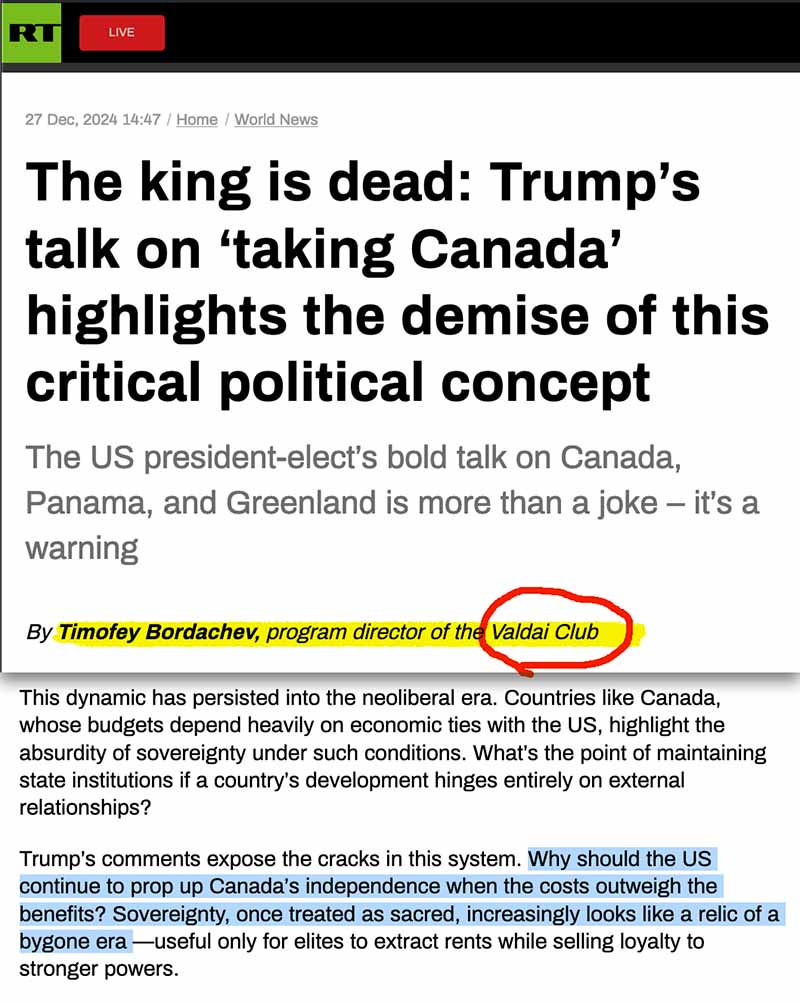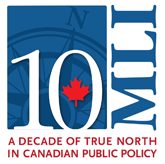
In an article for RT, Valdai Club Program Director Timofey Bordachev claims that the United States is preparing to annex Canada, arguing that this scenario demonstrates the failure of the rules-based order and the erosion of sovereignty for nations like Canada—nations he falsely portrays as helpless vassals of the United States undeserving of independence.
In reality, there is no evidence that annexation of Canada is a serious or mainstream policy proposal in the United States, and Canada is neither helpless nor on the verge of being subsumed by its neighbour. However, by selectively framing this topic and emphasizing provocative rhetoric, the article contributes to a narrative that serves Russia’s interests in destabilizing Western alliances and eroding confidence in the liberal international order.
The Claims
- Canada is a weak or subordinate state
- The piece casts Canada as a passive or dependent neighbour that cannot defend itself without the United States. This framing diminishes Canada’s sovereignty and paints it as vulnerable, suggesting that an annexation or direct confrontation would not be unrealistic.
- “The liberal rules-based order” is failing or hypocritical
- The article implies that the current global order, championed by liberal democracies (including Canada), is in decline or is fundamentally flawed. It may insinuate that Canada’s reliance on this system leaves it exposed to external threats—be they from the US or elsewhere.
- Amplification of a Trump-Canada conflict
- By highlighting any Trump rhetoric on Canada, the piece attempts to inflame divisions and depict a severe rift in US-Canada relations. It leverages Trump’s reputation for provocative statements to portray the West as fractious, self-interested, and disunited.
The Facts
- Trump’s “annex Canada” remarks
- While Donald Trump has occasionally made eyebrow-raising comments about Canada—such as mock threats or brash statements—it is important to note that there is no formal US policy, credible plan, or mainstream political consensus to annex Canada. These remarks are typically interpreted as hyperbole, rally lines for a specific political base, or internet memes rather than serious policy proposals.
- Canada’s actual geopolitical status
- Canada is a sovereign nation, a member of NATO, the G7, and numerous other international institutions. Its close ties with the US stem from robust trade (e.g., USMCA) and defense partnerships, but it maintains its own foreign policy and distinct governance. Any notion that it is “helpless” or “ripe for annexation” ignores Canada’s active role in global diplomacy and collective defense frameworks.
- The liberal rules-based order
- Countries like Canada, the US, and others in the G7 actively champion a rules-based international order. While the system faces legitimate criticisms (such as how it addresses global power imbalances), it is still the cornerstone of a functioning the community of global democracies. Portraying the order as imminently collapsing overlooks the continued collaboration and institutional strength among these nations.
- Trump-Canada relations in context
- Even during tense moments in US-Canada relations (such as trade renegotiations under Trump or disagreements over defense spending), neither side has come close to openly discussing annexation. The barbs in political speeches or on social media do not reflect official government stances.
Narrative Context
- Sowing division among Western allies
- A key hallmark of Russian propaganda is to highlight or amplify divisions between Western partners. By spotlighting Trump’s provocative statements about Canada, RT’s coverage may attempt to depict disunity or conflict within the Western bloc—undermining the sense of shared values and interests that buttress collective positions on international issues (such as NATO or support for Ukraine).
- Undermining the liberal-democratic order
- By framing Canada as a pawn or as a vulnerable “victim” of US aggression, the article seeks to show that the liberal-democratic order fails to protect even its strongest supporters. This portrayal can discredit institutions like NATO and the G7 and can suggest that countries relying on these institutions are naïve or at risk.
- Cast US foreign policy as destabilizing
- Emphasizing Trump’s outlandish rhetoric—without clarifying that it is political theater or hyperbole—helps portray US policy as erratic and expansionist. Such a portrayal aligns with a broader Russian narrative that the US (and by extension NATO) is the real destabilizing force globally.
- Shift focus away from Russia’s own conduct
- Running stories about alleged Western hypocrisy or divisions distracts from scrutiny of Russia’s actions (e.g., the war in Ukraine). By spotlighting internal tensions in Western countries, the article implicitly suggests, “the West cannot lecture others about sovereignty or international norms when it is at odds within its own ranks.”
- Exploiting Trump’s polarizing image
- Donald Trump is a polarizing figure who has, on many occasions, made statements that can be taken out of context or amplified for shock value. Russian state-sponsored media outlets frequently amplify such statements to create the impression of greater instability and unpredictability in American politics, thus questioning the integrity of US alliances and undermining confidence in the US-led order.

